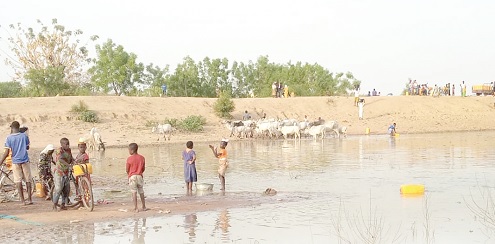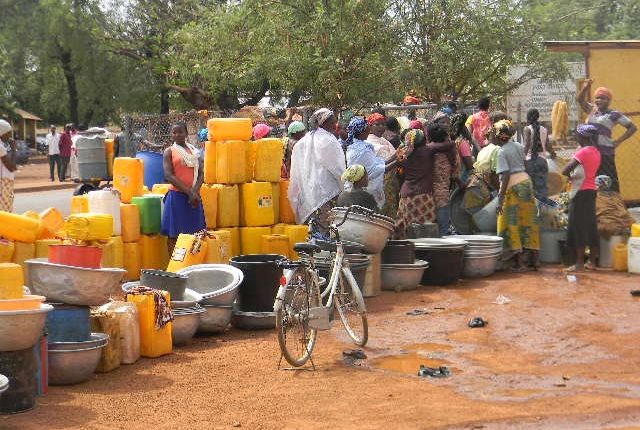Once celebrated as one of West Africa’s fastest-growing urban centers, Tamale now faces a sobering paradox: remarkable physical expansion paired with a worsening water crisis. Over the past decade, the city has seen the rise of new markets, roads, and residential areas. Yet, for tens of thousands of residents, access to safe and reliable water remains a daily struggle—threatening public health and stalling the city’s development.
Residents Cry Out: “We Are Tired”
From Bamvum to Dungu and Nyohini, frustrated residents share a common refrain: water is no longer a guarantee.
“We are tired of empty taps and broken promises,” said Hawa Ibrahim, a mother of five in Vittin. “We wake up at dawn to search for water, sometimes walking miles to find a borehole. The cost of water from tankers keeps going up, but what choice do we have?”
Alhaji Fuseini, a taxi driver in Nyankpala, added, “How can we grow as a city when we can’t even solve something as basic as water? Every election we are promised a solution, but here we are—still suffering.”

A Crisis Decades in the Making
Tamale’s water issues are deeply rooted. The city’s main supply point, the Nawuni Head Works, is struggling to operate at full capacity. Despite an increase in installed water supply capacity—from 13,000 to 45,000 cubic meters per day—current demand exceeds 90,000 cubic meters daily. With the population surpassing 374,000 in 2021 and growing rapidly, the gap continues to widen.
A once-promising solution—the Biwater expansion project—failed to meet expectations, leaving many communities reliant on water rationing, tanker services, and boreholes, many of which are now contaminated or drying up.
Yaa Naa’s Call for Action
Amid rising public frustration, the Overlord of Dagbon, His Majesty Yaa Naa Abukari II, has added his influential voice to the debate, urging the government to act with urgency.
“Tamale cannot continue to grow on empty promises and dry taps. Access to clean water is a basic right of our people. I am calling on the government to fix this crisis now—our future depends on it,” the Yaa Naa said during a recent by President John Mahama to the Gbewaa Palace in Yendi.
His appeal has further energized calls from civil society and policy analysts who view the crisis not just as a local issue, but a national emergency.
New Government Steps In
Recognizing the urgency, the new government has begun rolling out a series of interventions aimed at addressing Tamale’s water challenges. Ghana Water Limited has launched interim efforts to stabilize supply—by enhancing output at the Dalun Water Treatment Plant, plugging system losses, and improving equitable distribution through zoning and rationing schedules.
However, critics argue that timelines remain vague and residents are yet to see concrete results on the ground.
A Systemic Challenge Rooted in Poor Planning
Policy experts point to deeper, structural issues. Ziblim Alhassan Bonzali, a fellow at the Center for Development and Policy Advocacy, noted that the crisis stems from years of inadequate planning and lack of investment.
“What Tamale needs is not just a new plant but a comprehensive, long-term water infrastructure strategy. This includes upgrading outdated pipelines, expanding storage systems, and integrating water security into urban planning,” Bonzali emphasized.
The Water Research Institute (WRI) of CSIR has also raised alarms about water quality in boreholes and untreated sources now relied on by desperate residents. Dr. Emmanuel Mensah of WRI warns that some communities may face an impending health crisis if unsafe water usage continues.

A City at the Crossroads
Tamale’s water woes now stand as a test of political will and civic responsibility. As Ghana works toward achieving Sustainable Development Goal 6—ensuring access to water and sanitation for all—the situation in Tamale highlights the widening gap between policy and reality.
The choices made by this new administration could determine whether Tamale’s future is one of promise or persistent scarcity. If properly addressed, the city could emerge as a model for sustainable urban water management in Ghana.
But if ignored, the current crisis threatens to erode not only public confidence but also the very development gains Tamale has made over the past decade.
For Tamale’s residents, water is not a luxury—it is life. And the time to act is now.
Source : Ibrahim Angaagmeni Alhassan/Zaaaghana.com


